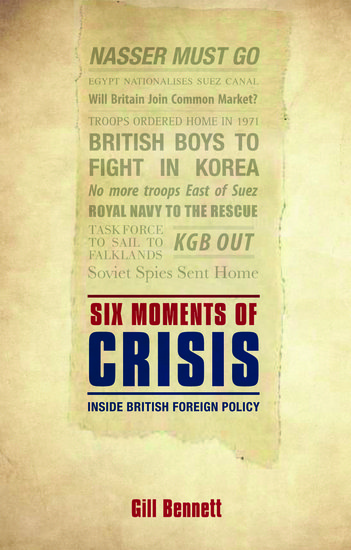The Telegraph Hay Festival is taking place from 23 May to 2 June 2013 on the edge of the beautiful Brecon Beacons National Park. We’re delighted to have many Oxford University Press authors participating in the Festival this year. OUPblog will be bringing you a selection of blog posts from these authors so that even if you can’t join us in Hay-on-Wye, you won’t miss out. Don’t forget you can also follow @hayfestival and view the event programme here.
Gill Bennett will be appearing at The Telegraph Hay Festival on Thursday 30 May 2013 at 1pm, talking to Nik Gowing about six moments of crisis inside British foreign policy. More information and tickets.
By Gill Bennett
Who would want to be a Cabinet minister? Clearly, all ambitious politicians entertain some hope of high, if not the highest, office. But I am asking the question in a more rhetorical sense. For in the almost universal cynicism, if not downright hostility, to politicians generally and government ministers in particular that pervades the media and much of the general public, I think that too few people stop to consider what a difficult job it is.
No matter what the area of ministerial responsibility, there will be major problems, political hot potatoes, and budgetary black holes to deal with, even in good times; and only too often times, in economic terms, are far from good. The higher the office, the more relentless the pressure and the greater the burden of decision. Quite apart from a minister’s departmental responsibilities, he or she must also consider their constituents, Party political pressures, Parliamentary committees, prominent interest groups, the views of senior officials, their obligations under British, European and international law—and, most of all, their Cabinet colleagues, including the top dog of all, the Prime Minister.
When Cabinet meets, all these factors converge, no matter what the subject on the agenda. A discussion on, say, education policy can be derailed by an international crisis. Preparations for an international meeting become mired in budgetary wrangling. A local healthcare crisis threatens a colleague’s position. Every day brings new challenges to disrupt the best-laid plans. And one must not forget that domestic ministers often have strong views on foreign policy, just as those dealing with overseas matters do not relinquish their interest in domestic issues.
Those who aspire to Cabinet rank must, therefore, be confident, strong-minded, and full of stamina, and understand that those characteristics will be branded by commentators as arrogance, prejudice, and ignorance of ordinary people’s lives. As the veteran Labour politician Gerald Kaufman wrote in his book How to be a Minister, “If you do not very rapidly develop immunities to cocoon yourself in a protective skin, you are defeated before you have even begun.” (He also warned against two debilitating diseases, Ministerialitis and Departmentalitis.)
For the Prime Minister, and those Cabinet ministers who deal with foreign and defence policy in particular, there is the added burden of having to be aware of what is going on in the rest of the world, and how the particular issue at hand impacts on or is affected by events in what may seem remote corners of the globe. Working on my recent book I examined six policy decisions, from Korea in 1950 to the Falklands in 1982, to show the range of pressures exerted on the Cabinet ministers who had to take those decisions. When examining policy decisions it’s important to put aside hindsight as much as possible and look at what ministers could have known at the time, and the factors that affected their thinking. Of course not all decisions that governments take are good ones: but by looking at them from the inside out, instead of in the light of what we now know happened, we can understand better how they came to be taken. And even looking at policy decisions made several decades ago, it is not hard to see how many of the same factors still affect British policy-making: the close but sometimes prickly Anglo-American relationship, the ambivalence about Europe, the enduring legacy of a global role, to name but a few.

I chose to write about foreign policy because, as a historian who has worked within the Foreign and Commonwealth Office for more than thirty years, that is what I know most about. But the more I investigated the policy-making process, the more convinced I became that this kind of analysis could be applied usefully to any area of ministerial responsibility. In a democratic system we elect a government to represent our interests in the world and to carry out the policies the party in power has campaigned to pursue. Despite the omnipresence of information, whether from traditional or social media, it is hard for the ordinary citizen to understand what is being done in his or her name. This is particularly true in foreign policy, which is extremely complex and fast-moving. Government ministers, whatever we may think of them, are doing a difficult job and it is only right we make an effort to understand it. I often think that if we really did understand what it is like, we might well wonder why anyone wants to be a Cabinet minister.
Gill Bennett, MA, OBE was Chief Historian of the Foreign & Commonwealth Office from 1995-2005 and Senior Editor of the UK’s official history of British foreign policy, Documents on British Policy Overseas. She is the author of Six Moments of Crisis: Inside British Foreign Policy. As a historian working in government for over thirty years, she offered historical advice to twelve Foreign Secretaries under six Prime Ministers. A specialist in the history of secret intelligence, she was part of the research team working on the official history of the Secret Intelligence Service, written by Professor Keith Jeffery and published in 2010. She is now involved in a range of research, writing and training projects for various government departments.
Subscribe to the OUPblog via email or RSS.
Subscribe to only British history articles on the OUPblog via email or RSS.
Image credit: By White House photographer Pete Souza from Washington, DC. Public domain via Wikimedia Commons



Recent Comments
There are currently no comments.